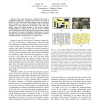Free Online Productivity Tools
i2Speak
i2Symbol
i2OCR
iTex2Img
iWeb2Print
iWeb2Shot
i2Type
iPdf2Split
iPdf2Merge
i2Bopomofo
i2Arabic
i2Style
i2Image
i2PDF
iLatex2Rtf
Sci2ools
ICRA
2010
IEEE
2010
IEEE
Probabilistic shadow information spaces
— This paper introduces a Bayesian filter that is specifically designed for counting targets that move outside of the field of view while performing a sensor sweep. Information space concepts are used to dramatically reduce the filter complexity so that information is processed only when the shadow region (all points invisible to the sensors) changes combinatorially or targets pass in and out of view. Previous work assumed perfect observations; however, this paper extends the approach to enable probabilistic disturbances. Practical algorithms are introduced, implemented, and demonstrated for computing the filter outputs based on realistic data.
Bayesian filter | ICRA 2010 | Robotics | Sensor Sweep | Shadow Region |
Related Content
| Added | 26 Jan 2011 |
| Updated | 26 Jan 2011 |
| Type | Journal |
| Year | 2010 |
| Where | ICRA |
| Authors | Jingjin Yu, Steven M. LaValle |
Comments (0)

